Overview
This article shines a light on the many meaningful ways we can celebrate Autism Awareness Month. It emphasizes the importance of community engagement, educational initiatives, and advocacy, all while nurturing understanding and support.
Imagine how:
- Workshops
- Social media campaigns
- Art exhibitions
- Partnerships with local businesses
can empower families. These activities not only promote awareness but also foster a compassionate environment for individuals on the spectrum. By coming together, we can create a world where everyone feels understood and valued.
Introduction
As Autism Awareness Month unfolds, a wave of initiatives emerges, dedicated to fostering understanding, acceptance, and support for individuals on the autism spectrum and their families. This month is not just a time for awareness; it is a heartfelt call to action. From community events and educational workshops to impactful social media campaigns, we have a unique opportunity to amplify voices and share personal stories that resonate deeply within our society.
Organizations like ASD Media play a pivotal role in providing essential resources and community support. Think about how local businesses and virtual events can expand outreach and participation, inviting everyone to join this important conversation. This collective effort not only enhances awareness but also encourages a culture of inclusion. It’s imperative for each of us to engage in advocacy and contribute to a more understanding world.
As the narrative around autism continues to evolve, the importance of tailored approaches and community involvement becomes ever more apparent. Together, we can shape a brighter future for those affected by autism. Let’s take the time to learn, to listen, and to support one another in this journey.
ASD Media: Empowering Families During Autism Awareness Month
During happy autism awareness month, ASD Media plays a vital role in empowering families by offering essential resources, effective strategies, and robust community support. Through newsletters, workshops, and online forums, ASD Media equips parents and professionals with the latest information and tools crucial for successful ABA therapy implementation. Families are encouraged to reach out to ASD Media at (877) 734-4536 for immediate assistance and resources. This initiative not only enhances understanding of the condition but also fosters a sense of belonging and teamwork among families. By sharing experiences and insights, families can better navigate the challenges related to ADHD, ultimately leading to improved outcomes for their children.
The statement from O. Ivar Lovaas, 'If they can't learn the way we teach, we teach the way they learn,' underscores the importance of personalized approaches in ABA therapy, aligning beautifully with the theme of empowerment during Awareness Month. Additionally, the growing initiatives for neurodiversity acceptance highlight the significance of support networks, making ASD Media's contributions even more crucial during this happy autism awareness month. Understanding the complexities of the disorder, as emphasized in the case study titled 'Genetic and Environmental Factors in Autism Spectrum Disorder,' reinforces the need for targeted interventions and community support.
Current statistics reveal that many families benefit from the resources available during Awareness Month, further underscoring the importance of ASD Media's role in providing these essential tools. Together, we can create a more informed and supportive community for all families navigating the journey of autism.
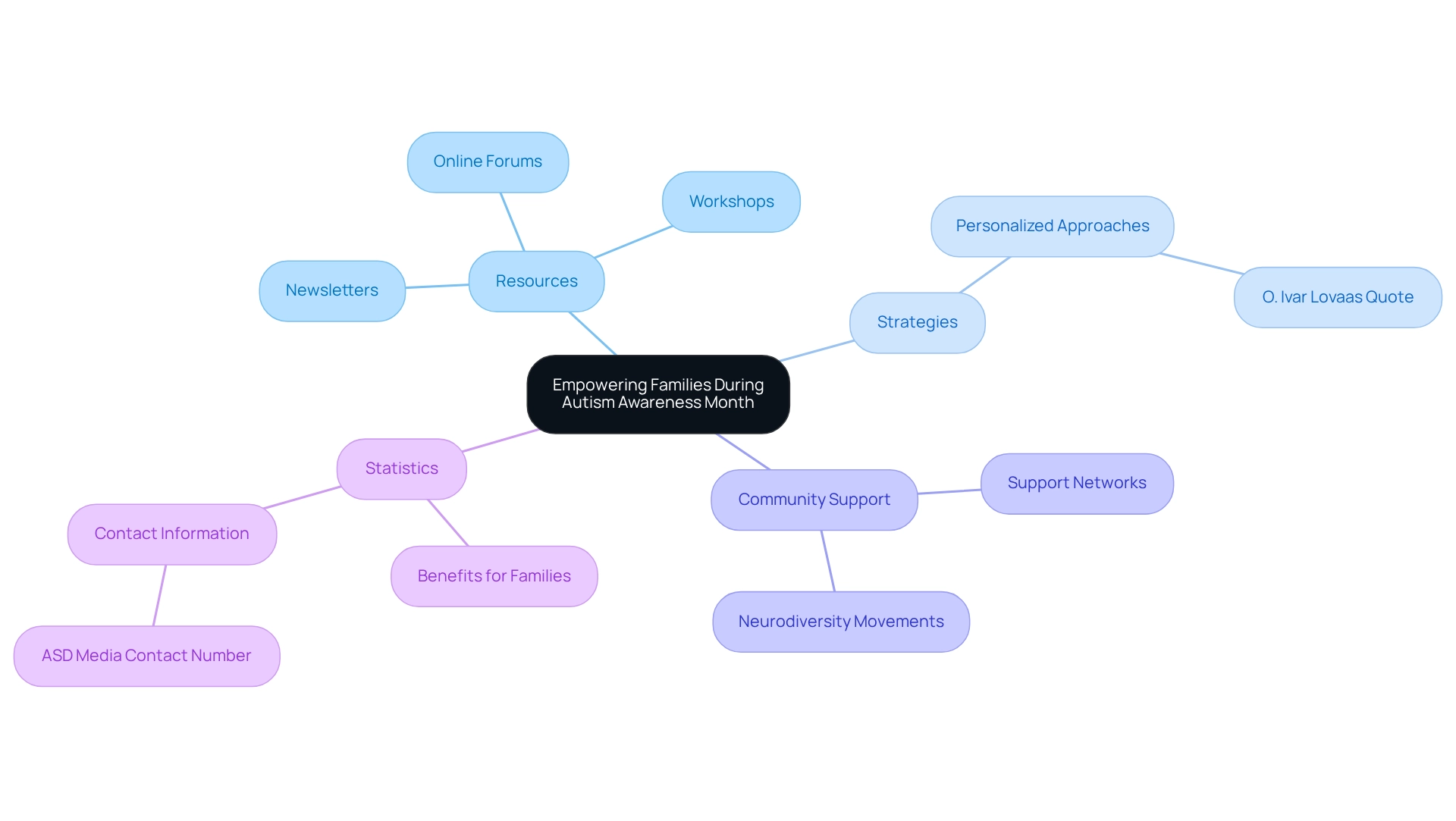
World Autism Awareness Day: A Global Call to Action
World Autism Awareness Day, observed on April 2, stands as a vital global initiative dedicated to promoting understanding and acceptance of autism spectrum disorder (ASD). This day invites individuals and organizations worldwide to engage in events that raise awareness about autism. Communities come together through various initiatives, such as illuminating buildings in blue and organizing educational events, fostering a more inclusive environment for those with developmental disorders.
The history of Awareness Month for autism dates back to the 1970s, when the National Autism Society designated April as a time for raising awareness. In 2008, the United Nations recognized April 2nd as World Awareness Day for individuals with autism spectrum disorder, emphasizing the unique needs of those on the spectrum. A pivotal moment occurred in 2011 when the Autism Self-Advocacy Network advocated for a shift from mere awareness to true acceptance, a movement that gained traction and was officially embraced by the Autism Society of America in 2020. This transition marks a significant milestone in advocacy for individuals on the spectrum, underscoring the importance of respect and understanding.
Statistics reveal that the prevalence of autism was recorded at 32.2 per 1,000 8-year-olds in 2022, highlighting the critical nature of these initiatives. While the occurrence of developmental disorders varies globally, with rates as low as 1 in 250 in India and 1 in 186 in China, there remains hope for the development of affected children. The collective efforts on this day aim to bridge gaps in understanding and support.
The impact of World Autism Awareness Day transcends mere awareness; it champions advocacy for enhanced resources and support systems. Effective community initiatives, including local events and global campaigns, showcase the power of collaboration in raising public awareness of autism. As we honor this day, happy autism awareness month serves as a reminder of the ongoing journey toward acceptance and respect for individuals on the spectrum, motivating everyone to contribute to a more inclusive society. Parents can take part by attending local events, sharing information on social media, or engaging in conversations that promote understanding and acceptance of those on the autism spectrum.
Community Events: Building Connections and Raising Awareness
Community events play a crucial role in fostering connections and enhancing awareness during happy autism awareness month. Activities such as local walks, fairs, and educational seminars create valuable opportunities for families, professionals, and advocates to come together. These gatherings not only cultivate a sense of belonging but also serve as platforms for sharing information, resources, and personal stories. By engaging in these events during happy autism awareness month, we nurture a culture of acceptance and understanding that greatly impacts the lives of those affected by autism.
Recent statistics reveal a direct correlation between participation in local events and increased awareness and support for autistic individuals, highlighting the importance of these initiatives. For instance, there has been a request to double the budget to enhance research and develop policies that provide better personal support and services for autistic people. Furthermore, case studies like 'The Importance of Community Outreach Programs' illustrate the effectiveness of such outreach in facilitating early identification of developmental disorders, as well as the benefits of applied behavioral analysis and occupational therapy.
When we participate in community activities, we contribute to creating a supportive atmosphere that empowers individuals with developmental disorders to overcome challenges and pursue self-sufficient living. As Daijah Moss beautifully expressed, 'Help create a world where everyone is valued.' Together, we can make a difference.
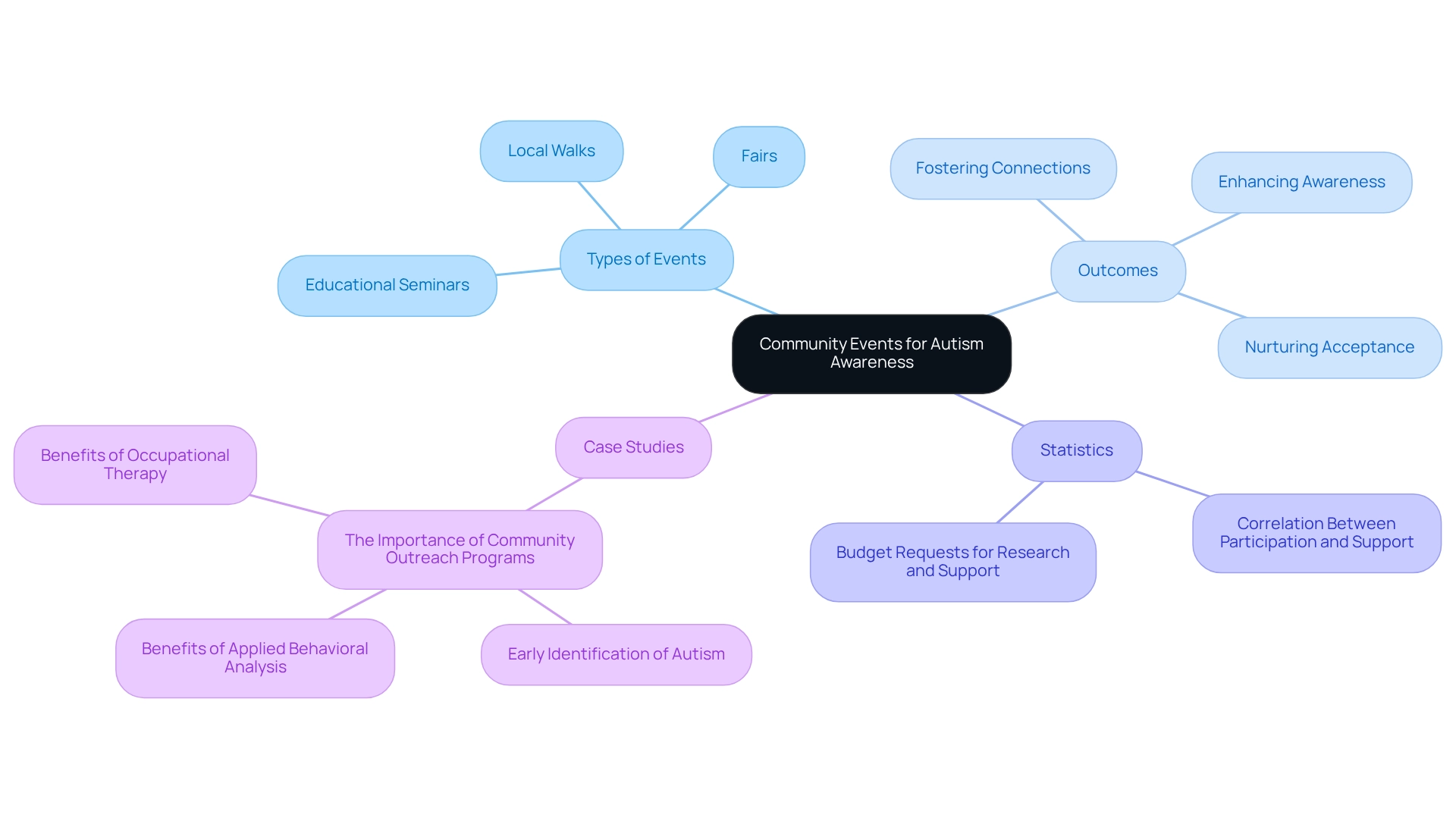
Social Media Campaigns: Amplifying Voices and Stories
Social media campaigns have emerged as a vital force in amplifying the voices and narratives of individuals with developmental disorders and their families. Hashtags such as #LightItUpBlue and #AutismAcceptance not only encourage users to share their personal experiences but also foster a sense of solidarity among those facing similar challenges. With millions of posts contributing to a wider conversation about the condition, these campaigns have shown considerable involvement. By utilizing these platforms, users can cultivate a supportive online community that champions understanding and acceptance.
The effectiveness of social media in raising awareness is beautifully illustrated by campaigns like the 'Not Invisible' initiative, which aligns with World Autism Awareness Day. This campaign advocates for the acknowledgment of autism spectrum conditions and equal involvement for those affected, rallying families, supporters, and lawmakers to take action during April. The use of hashtags has proven instrumental in driving engagement; studies indicate that posts featuring #LightItUpBlue significantly increase visibility and participation in autism advocacy efforts.
Moreover, expert opinions highlight the importance of respectful language and inclusive messaging in these campaigns. As Autism-Europe emphasizes, using language that resonates with people is essential for encouraging a supportive atmosphere. This strengthens the necessity for a community that values the perspectives of autistic individuals. Furthermore, the recent decision made by the European Parliament to standardize the rights of individuals on the spectrum throughout the EU underscores the significance of advocacy and awareness initiatives in this field. As we celebrate Neurodiversity Awareness Month, we also recognize the importance of a happy autism awareness month, as the role of social media in promoting acceptance and understanding continues to grow, making it an essential tool for advocacy and community building.
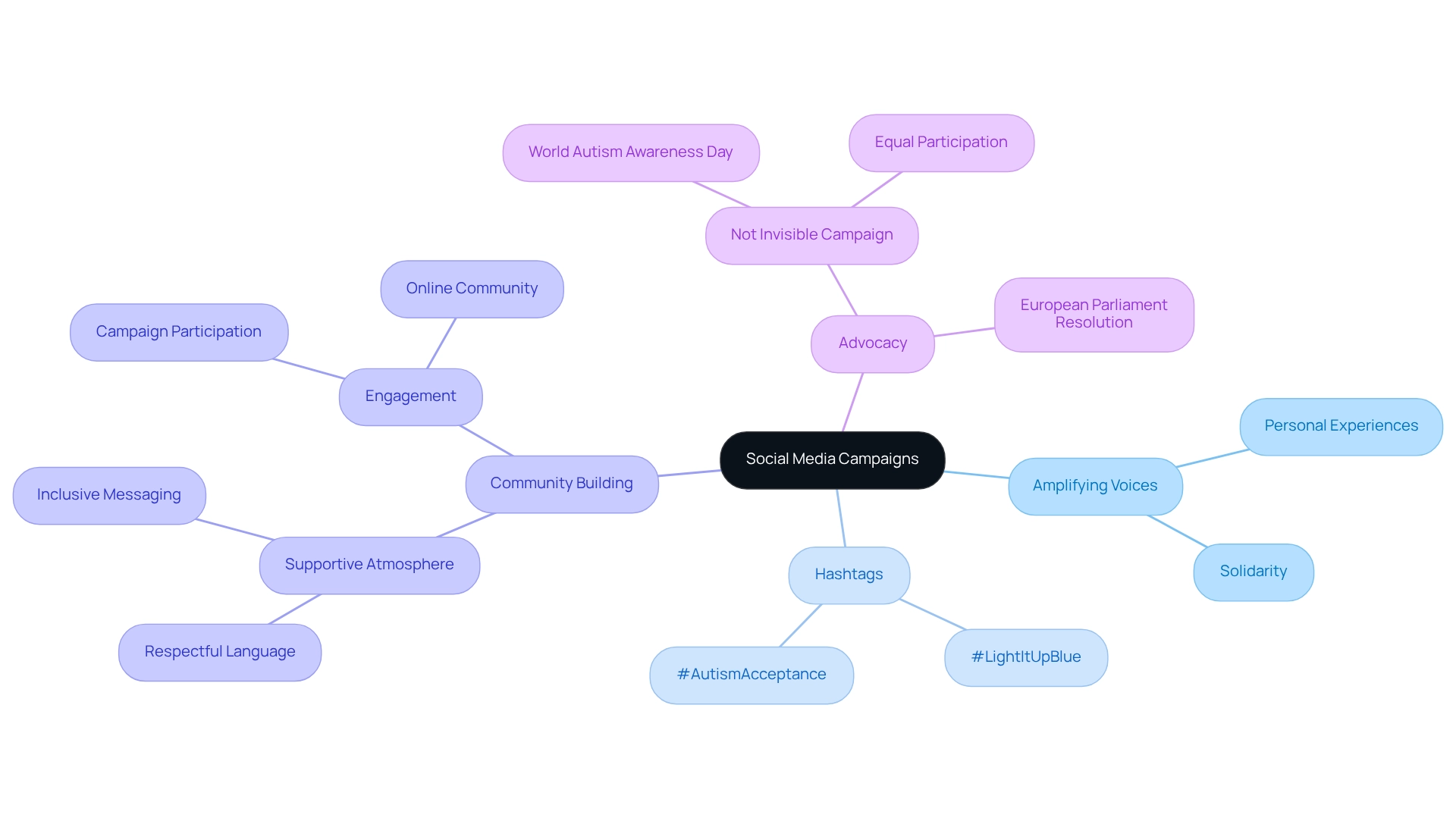
Educational Workshops: Informing and Empowering Parents
Educational workshops during Awareness Month are vital for parents seeking to deepen their understanding of their children's condition and develop effective support strategies. These workshops cover a range of topics, including:
- Behavior management
- Communication techniques
- Navigating available support services
By equipping parents with practical knowledge and skills, they empower them to become strong advocates for their children, nurturing their development and well-being. Furthermore, these workshops create opportunities for parents to connect with professionals and other families, fostering a supportive network that enhances their advocacy efforts.
For instance, the ECHO Autism: Emotional Regulation event on January 10, 2025, focuses on equipping families with tools to manage emotional challenges. It's important to remember that Autism Awareness Month, which we celebrate as happy autism awareness month in April, highlights the ongoing need for educational initiatives throughout the year. As participation in these workshops increases, so does the knowledge and confidence of parents, ultimately leading to improved outcomes for children with developmental disorders.
The Next Steps series also serves as a valuable resource for ongoing education in autism support, ensuring that parents have access to continuous learning opportunities. As Nita Ambani aptly stated, 'Education is not a tool for development – personal, community, and the nation. It is the foundation for our future.' This underscores the critical role of education in empowering parents. Data indicate that heightened involvement in educational workshops during Awareness Month correlates with improved advocacy initiatives, further emphasizing the significance of behavior management training for parents.
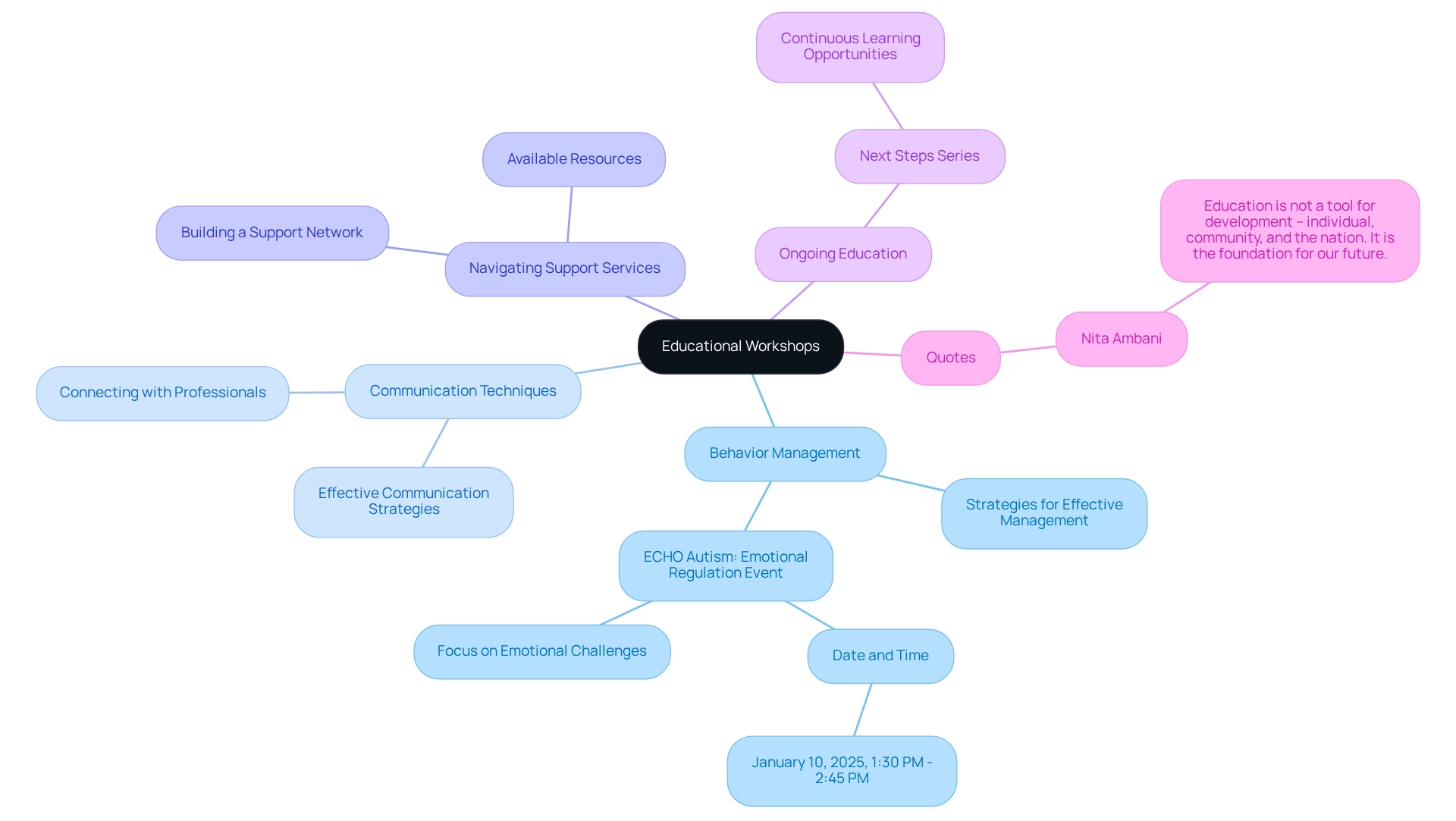
Art Exhibitions: Celebrating Creativity and Expression
Art exhibitions during happy autism awareness month serve as vibrant celebrations of creativity and expression among individuals on the spectrum. These events provide a vital platform for autistic artists to showcase their unique perspectives and talents, effectively challenging stereotypes while fostering a deeper understanding of autism. By highlighting the artistic achievements of these individuals, exhibitions promote neurodiversity and encourage meaningful discussions about inclusion.
Artistic expression, influenced by sensory processing differences, adds depth to these exhibitions. They not only empower artists to share their emotions and experiences but also act as therapeutic outlets that can lead to significant improvements in communication and mobility. For example, Alan's therapeutic journey illustrates how engaging in artistic expression has notably advanced his verbal communication and mobility.
In 2025, several remarkable art exhibitions are scheduled to amplify the voices of autistic artists and raise awareness of their contributions. These events have positively impacted public perceptions of autism, with statistics reflecting increased community participation and engagement. Understanding co-occurring conditions, such as allergies and sleep disorders, is crucial for comprehensive treatment and support strategies, which can also influence the artistic expression of autistic individuals.
As Vicky, a therapist, shared, "I understood what it would signify for him to have his song recorded," underscoring the profound impact that artistic opportunities can have on the lives of autistic people. By celebrating the talents of autistic individuals, these exhibitions play a pivotal role in enhancing awareness of autism, contributing to a happy autism awareness month while nurturing a culture of acceptance and understanding.
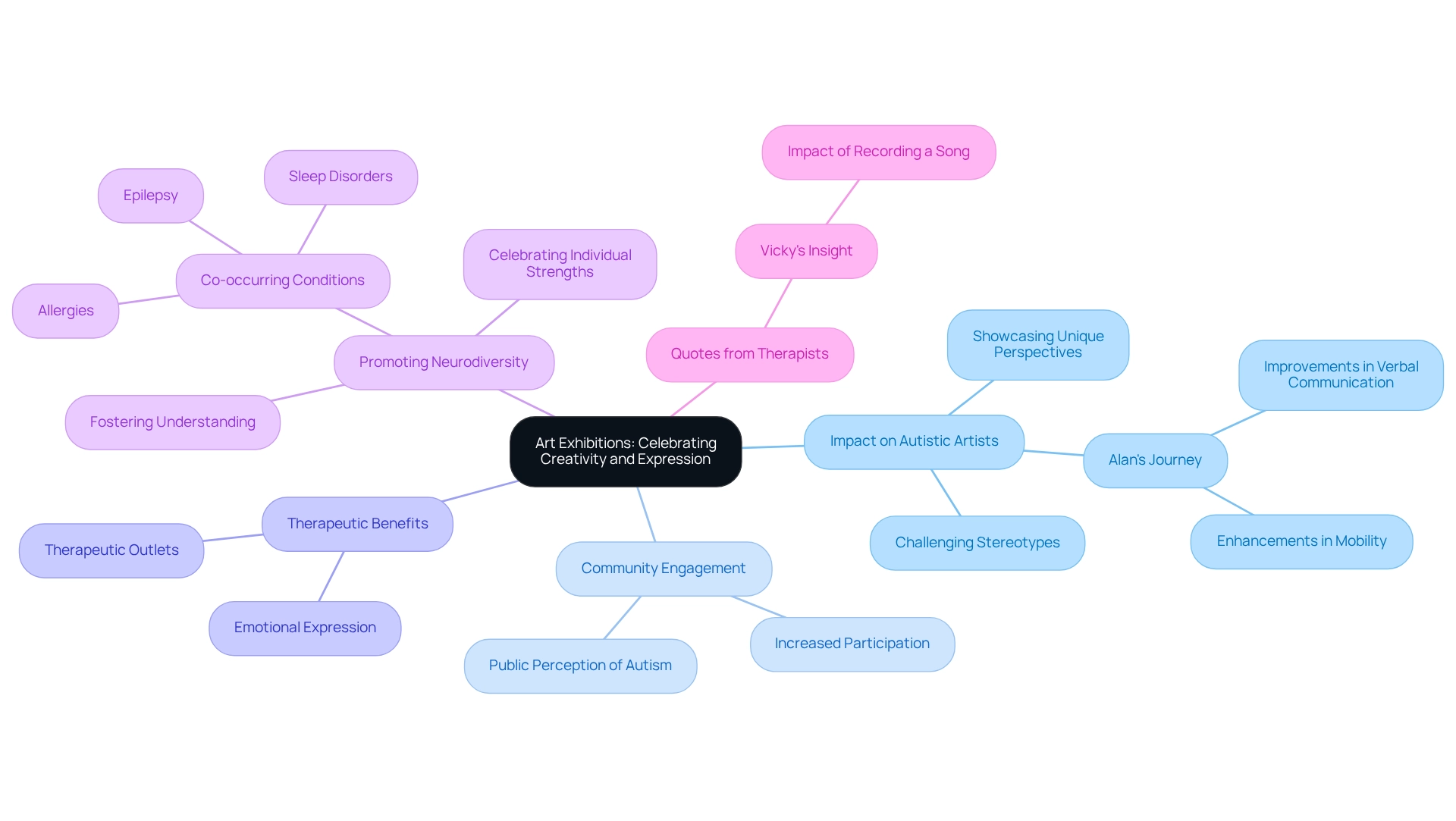
Local Business Partnerships: Supporting the Cause
Community business collaborations play a vital role in raising awareness about developmental disorders, particularly during happy autism awareness month. By partnering with businesses, organizations can access valuable resources, sponsorships, and promotional efforts that greatly enhance their outreach. Companies can get involved in various ways, such as:
- Organizing events
- Donating a portion of sales to autism-related initiatives
- Providing spaces for local gatherings
These partnerships not only generate essential funding but also cultivate a strong sense of involvement and commitment to supporting individuals with developmental disorders and their families.
Consider this: data from the National Survey of Children’s Health indicates that approximately 16.8 to 18.8 percent of young individuals are diagnosed with spectrum disorders. This statistic highlights the urgent need for increased awareness and support. Effective collaborations between local businesses and autism organizations can lead to impactful initiatives that resonate within the community, promoting acceptance and understanding. As one participant shared, "In those groups I feel safer in a way. There are others there who are themselves, and we are a bunch of weirdos." This sentiment beautifully illustrates the profound impact of community support.
Moreover, a recent webinar for ABA professionals showcased how tools like Catalyst can enhance understanding and application of effective strategies in supporting individuals with developmental disorders. As companies amplify their efforts to promote happy autism awareness month, they not only contribute to fundraising initiatives but also play a crucial role in creating inclusive environments that benefit everyone. Together, we can make a difference—let's join forces to support those in need and foster a community of understanding and compassion.
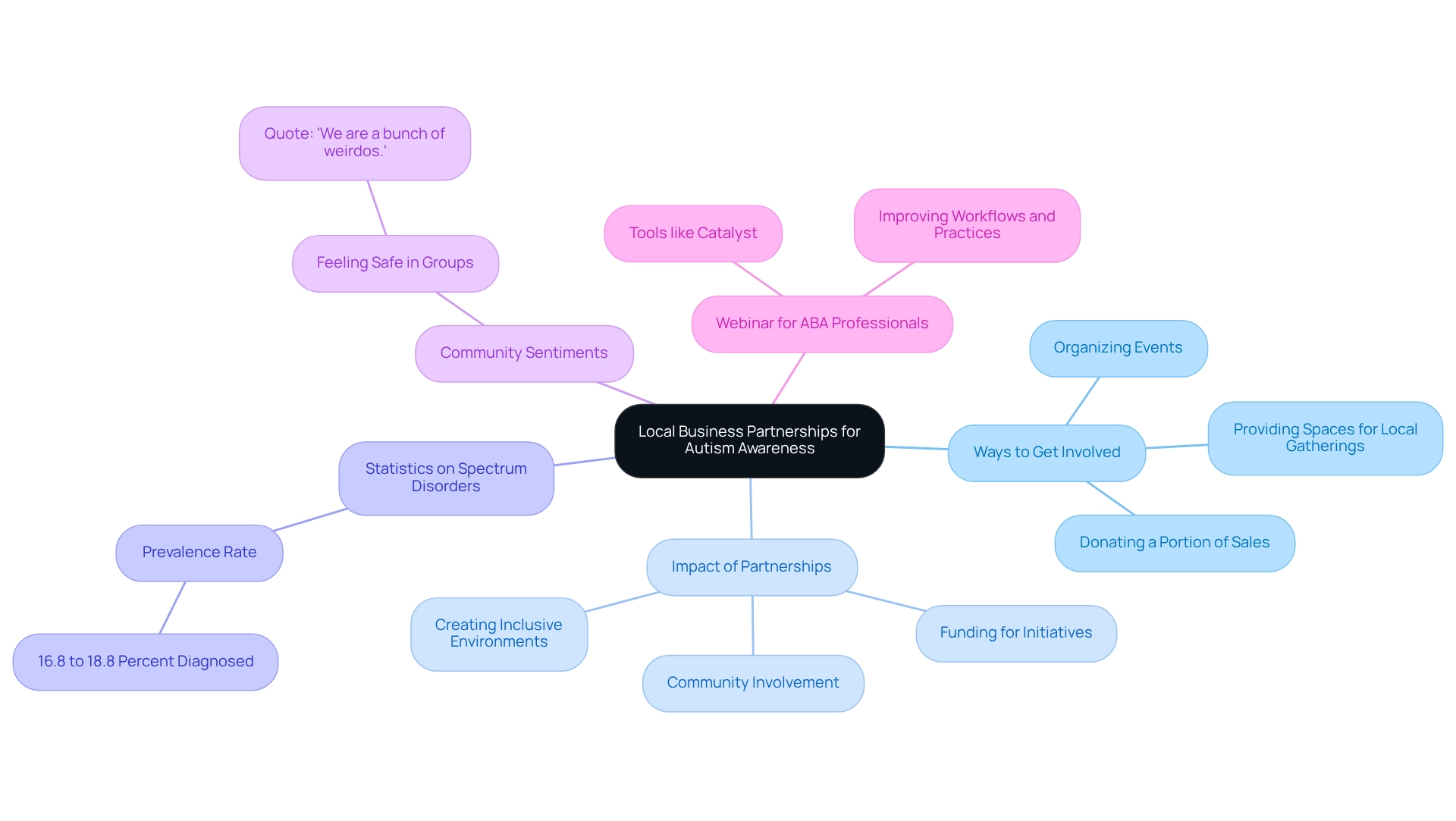
Virtual Events: Expanding Reach and Participation
Virtual events have become a vital force in expanding the reach and participation of awareness initiatives for developmental disorders. These online gatherings—spanning webinars, workshops, and virtual art shows—invite individuals from diverse backgrounds and locations to engage in meaningful discussions and activities. By breaking down geographical barriers, virtual events significantly enhance participation in autism awareness efforts, allowing a broader audience to share their experiences and access essential resources. This inclusiveness not only fosters a sense of belonging among participants but also reinforces support networks, creating an environment where everyone feels valued and heard.
Statistics indicate a remarkable increase in involvement in virtual events, with many organizations reporting a doubling of attendance compared to in-person gatherings. This trend highlights the growing significance of online platforms in reaching a wider audience. Experts emphasize that inclusivity in these initiatives is crucial; as one advocate noted, 'Acceptance is the key to unlocking the potential of every person.' Moreover, case studies illustrate that virtual events have effectively engaged diverse communities, showcasing their power in raising awareness and fostering understanding. For example, the case study titled 'Do Seed Oils Cause Autism?' addresses misconceptions surrounding the condition, helping to alleviate parental concerns stemming from misinformation.
The benefits of virtual events extend beyond mere attendance. They provide accessible formats for individuals who may face challenges attending traditional events, thereby enhancing overall community participation. Notably, materials are available in Arabic and tailored for Caribbean teaching contexts, underscoring the inclusivity of these initiatives. As we celebrate happy autism awareness month in 2025, the impact of online workshops and initiatives continues to resonate, reinforcing the importance of creating inclusive environments for dialogue and support. As O. Ivar Lovaas wisely stated, 'If they can't learn the way we teach, we teach the way they learn,' highlighting the adaptability of virtual events in meeting diverse learning needs. Additionally, Kerry Magro reminds us that 'Autism is not a label, it’s just one part of who I am,' emphasizing the significance of acceptance and understanding in our advocacy efforts.
Personal Stories: Sharing Experiences to Foster Understanding
Sharing personal narratives during happy autism awareness month serves as a vital catalyst for fostering understanding and compassion towards individuals on the spectrum. These heartfelt stories, shared through blogs, social media, and community events, illuminate the daily experiences and challenges faced by autistic individuals and their families. By showcasing unique journeys, these narratives personalize the condition, encouraging others to listen, learn, and embrace acceptance.
In 2025, a remarkable number of personal stories were shared, significantly enriching the conversation surrounding awareness of autism. Research highlights that community initiatives, like those provided by ASCV, have a profound impact. Their programs, which include social and recreational activities, enhance understanding and support within the community.
Moreover, a case study on NAB's neurodiversity program, in collaboration with DXC, demonstrates how prioritizing personal storytelling can lead to sustainable advocacy and the integration of neurodiverse talent. Rob Howse, Chief Operating Officer of Leeds Building Society, remarked that organizations like DXC are transforming their digital future by centering customer experiences. This mirrors the importance of focusing on personal narratives in advocating for individuals on the spectrum.
Ultimately, the value of sharing personal narratives cannot be overstated; they are crucial in nurturing empathy and driving meaningful change in perceptions of autism. We invite you to share your own experiences or support those who do this happy autism awareness month, as every story contributes to a greater understanding and acceptance.
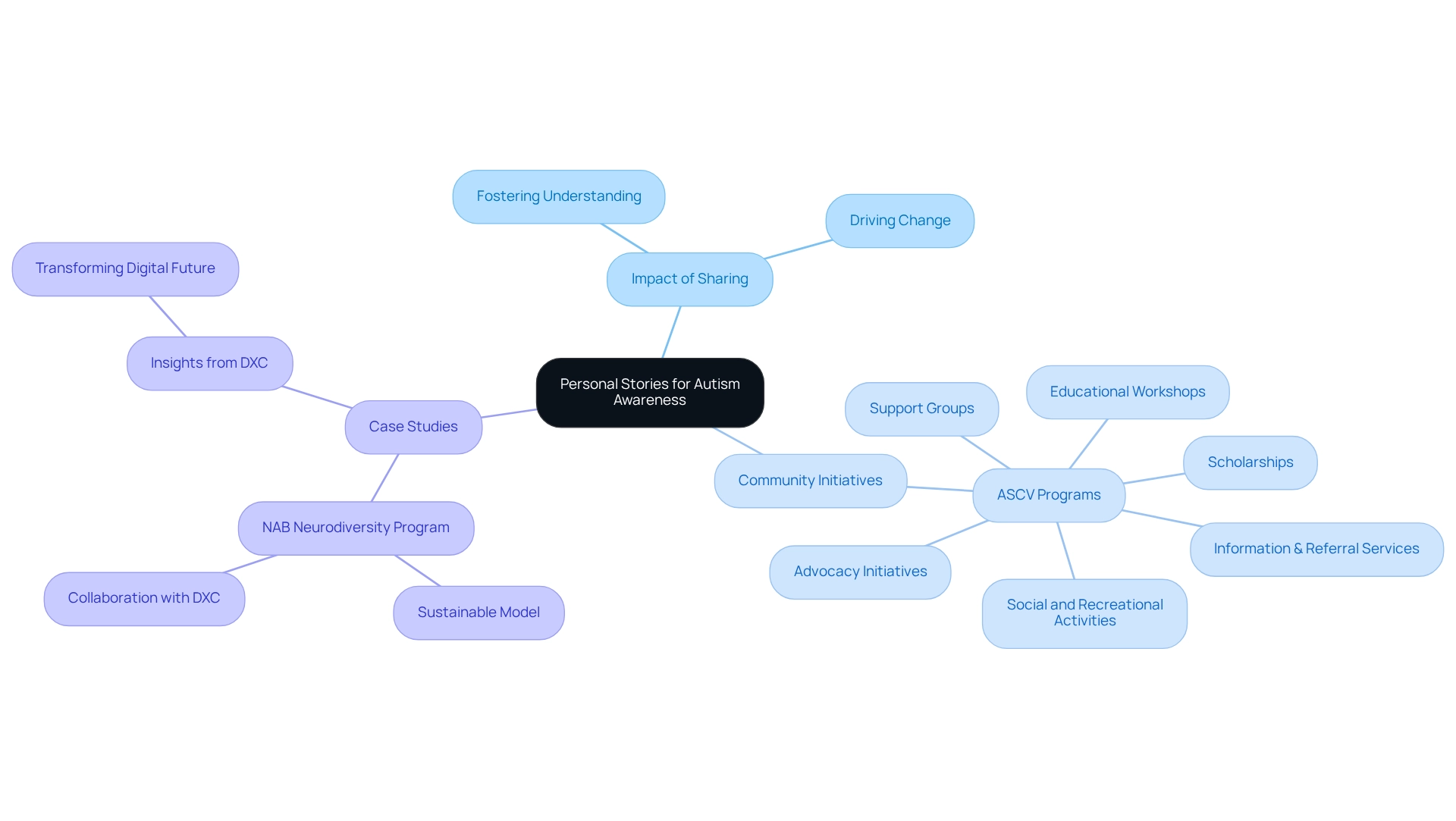
Advocacy Efforts: Taking Action for Change
Advocacy efforts during happy autism awareness month are essential in fostering meaningful change for individuals affected by autism and their families. These initiatives encompass a variety of actions, including:
- Advocating for improved access to vital services
- Promoting inclusive education policies
- Raising awareness about the rights of autistic individuals
By participating in advocacy, local community members can significantly influence public policy and cultivate a more supportive environment for those impacted by developmental disorders. Collaborative efforts, such as petitions, awareness campaigns, and community forums, empower individuals to take action and amplify their voices.
In 2025, the advocacy for neurodiversity rights has gained remarkable momentum, with numerous campaigns focused on enhancing services and support. The Autism Society of America, in celebration of the 30th anniversary of the Americans with Disabilities Act (ADA), emphasizes the ongoing need for robust advocacy efforts. Experts agree that effective advocacy can lead to substantial improvements in services for individuals with developmental disorders, ensuring that the needs of individuals and families are met.
Community advocacy has proven its effectiveness, prompting policy changes that benefit those affected by autism spectrum disorders. For instance, case studies illustrate how local advocacy organizations have successfully influenced legislation, resulting in increased funding for services related to developmental disorders and improved access to educational resources. Supportive statements, such as Mary Barbera's assertion to 'embrace the amazing gift of neurodiversity,' resonate deeply, inspiring others to engage in the cause and underscoring the importance of recognizing the strengths of those on the spectrum.
As we celebrate happy autism awareness month, it is vital to acknowledge the significance of advocacy in raising awareness and fostering understanding. By engaging in advocacy efforts, individuals can contribute to a collective movement that not only supports those with autism but also nurtures a culture of acceptance and inclusion.
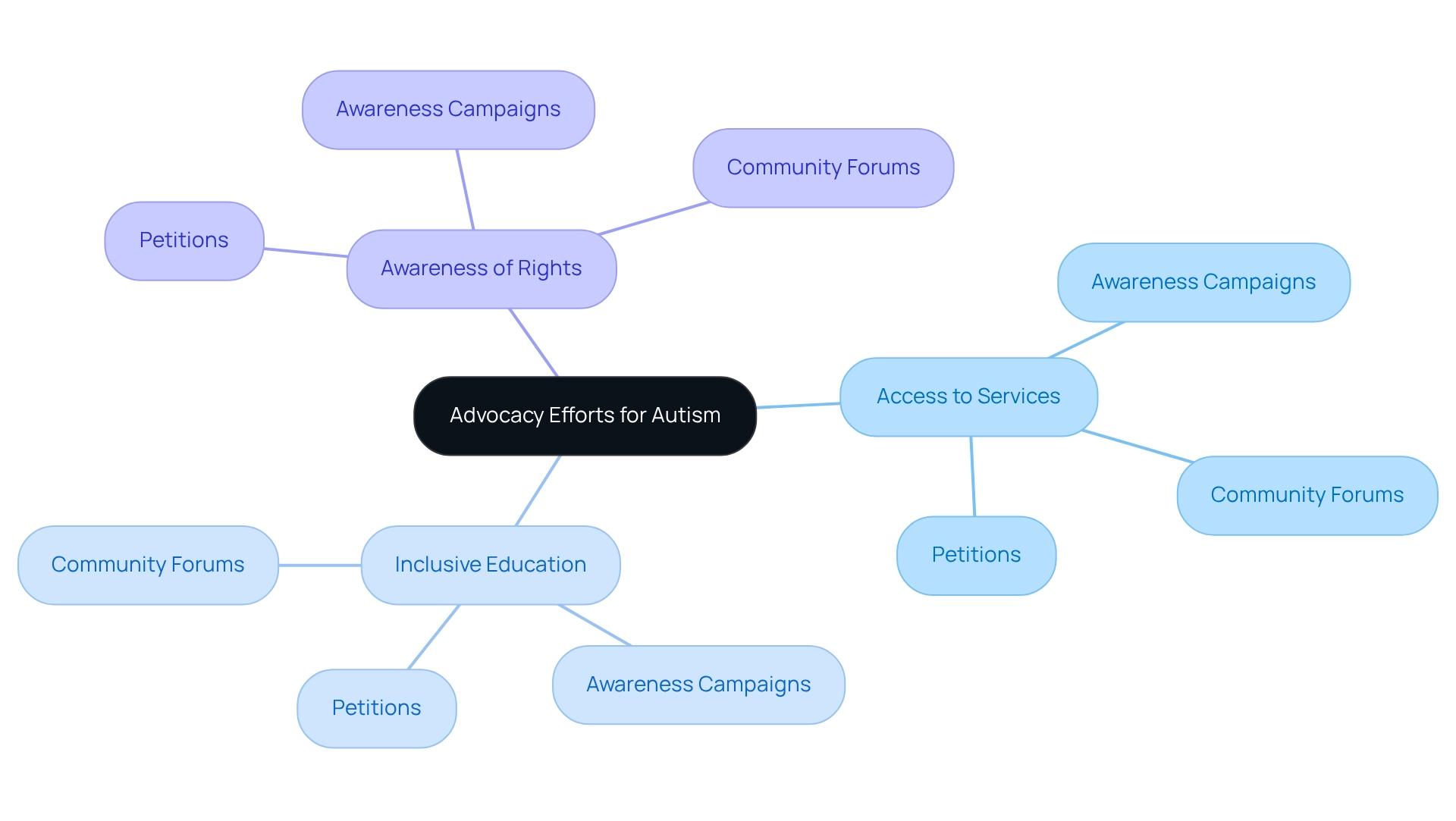
Conclusion
The initiatives of Autism Awareness Month illuminate the vital role of community engagement, education, and advocacy in nurturing understanding and acceptance for individuals on the autism spectrum. Organizations like ASD Media are essential, offering resources that empower families to navigate challenges with confidence. Through educational workshops and community events, connections among families and advocates flourish, fostering a culture of inclusion.
World Autism Awareness Day serves as a global call to action, inviting everyone to participate in activities that promote awareness and acceptance. This transition from mere awareness to genuine acceptance underscores the respect for the unique contributions of autistic individuals. Social media campaigns amplify voices and personal stories, nurturing solidarity and meaningful dialogue.
As communities come together through local events, business partnerships, and virtual gatherings, the impact of these initiatives becomes increasingly clear. Higher participation rates correlate with a greater awareness and support for individuals with autism, reinforcing the importance of our collective efforts. Sharing personal narratives and advocating for change lead us toward a more inclusive society that celebrates neurodiversity.
In celebrating Autism Awareness Month, we recognize that the journey toward acceptance and understanding is ongoing. Every action, no matter how small, contributes to a brighter future for those affected by autism. The call to learn, listen, and support one another is crucial in creating a world where every individual is valued and empowered to thrive.
Frequently Asked Questions
What role does ASD Media play during Autism Awareness Month?
ASD Media empowers families by offering essential resources, effective strategies, and robust community support through newsletters, workshops, and online forums. They equip parents and professionals with the latest information and tools crucial for successful ABA therapy implementation.
How can families receive immediate assistance from ASD Media?
Families can reach out to ASD Media at (877) 734-4536 for immediate assistance and resources.
What is the significance of O. Ivar Lovaas's statement regarding ABA therapy?
O. Ivar Lovaas's statement, "If they can't learn the way we teach, we teach the way they learn," emphasizes the importance of personalized approaches in ABA therapy, which aligns with the theme of empowerment during Autism Awareness Month.
What historical context surrounds Autism Awareness Month?
Autism Awareness Month dates back to the 1970s when the National Autism Society designated April for raising awareness. The United Nations recognized April 2nd as World Autism Awareness Day in 2008, and a shift from awareness to acceptance was advocated by the Autism Self-Advocacy Network in 2011.
What statistics highlight the prevalence of autism?
In 2022, the prevalence of autism was recorded at 32.2 per 1,000 8-year-olds, with global variations in occurrence, such as rates of 1 in 250 in India and 1 in 186 in China.
How do community events contribute to autism awareness?
Community events such as local walks, fairs, and educational seminars foster connections and enhance awareness, providing valuable opportunities for families, professionals, and advocates to share information and personal stories.
What impact does participation in community events have on awareness and support for autistic individuals?
Recent statistics show a direct correlation between participation in local events and increased awareness and support for autistic individuals, highlighting the importance of these initiatives.
What are the benefits of community outreach programs for autism?
Community outreach programs facilitate early identification of developmental disorders and provide benefits such as applied behavioral analysis and occupational therapy, contributing to a supportive atmosphere for individuals with developmental disorders.




